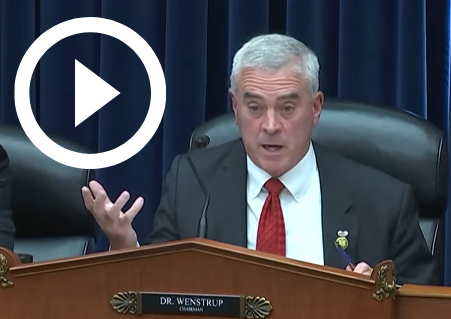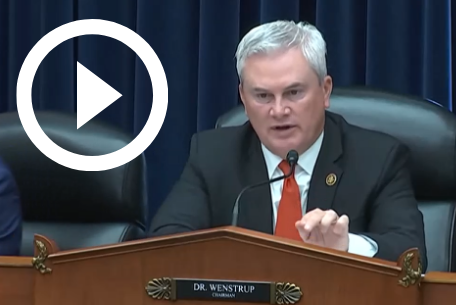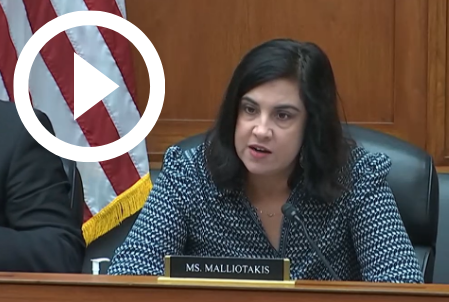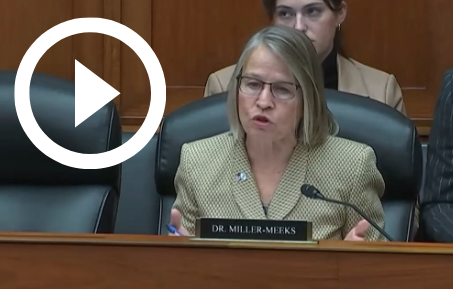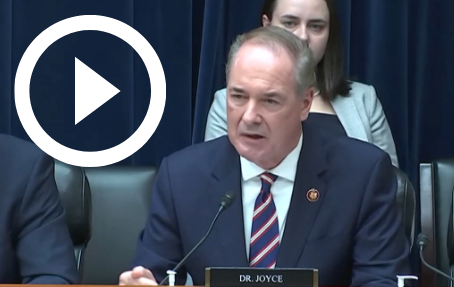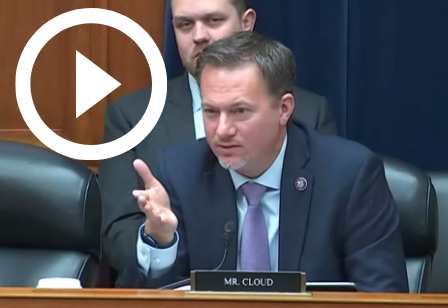Hearing Wrap Up: High-Risk Laboratories Need Updated Biosafety and Biosecurity Standards, COVID-19 Exacerbated Shortcomings
WASHINGTON — The Select Subcommittee on the Coronavirus Pandemic held a hearing titled “Strengthening Biosafety and Biosecurity Standards: Protecting Against Future Pandemics” to evaluate the effectiveness of existing biosafety and biosecurity practices in the aftermath of the COVID-19 pandemic and to discuss future policy improvements. Leading experts in biosafety and biosecurity testified to the disjointed domestic and foreign oversight mechanisms that create increased opportunity for incidents at high-risk laboratories. Select Subcommittee members discussed U.S. funding of risky-gain-of-function research in Wuhan, China and contemplated how current policies could be amended to prevent any future taxpayer support of dangerous laboratories abroad. Additionally, both Members and witnesses noted the lack of clear standards for design, construction, and operation of high-containment laboratories increases the risk of research-related accidents. Ensuring improved and modernized biosafety and biosecurity standards across public and private sectors will help prepare Americans and the international community for a future health crisis.
Key Takeaways
Biosafety and biosecurity standards for high-risk laboratories in the U.S. and abroad are confusing, overlapping, and often require individual facilities and scientists to police themselves.
Dr. Gerald Parker, leading biosecurity expert and the Associate Dean for Global One Health at Texas A&M, described the convoluted domestic and foreign biosecurity policies as “patchwork” that needs immediate improvement: “I’m not saying that each one is a bad policy or hasn’t been effective, but it’s the overall kind of patchwork. It’s confusing for research institutions about who’s their oversight authority and for what pathogens, for what funding stream and so forth. So, we need some kind of consolidation and also to look for how we can get efficiencies, close any gaps, and really make it easier for the research institutions because it’s pretty confusing and that confusion increases our biosecurity risk.”
Dr. Jamie Yassif, biophysicist and vice president of Global Biological Policy and Programs at the Nuclear Threat Initiative, opened her testimony by highlighting the staggering number of countries that do not possess sufficient oversight mechanisms for high-containment laboratories: “It’s in our interest to take an international approach to bolstering biosafety and biosecurity. That’s because infectious diseases, no matter their origin, do not respect borders. Unfortunately, biosafety and biosecurity are very weak globally. For example, according to the Global Health Security Index, only 6% of countries have national level oversight measures for dual use bioscience research.”
The Wuhan Institute of Virology lacked appropriately trained technicians and often conducted risky gain-of-function research on dangerous coronaviruses at inadequate biosafety levels prior to the COVID-19 pandemic.
Chairman Wenstrup used a mountain of evidence — spanning 2018 through the start of the pandemic — to prove that American public health authorities knew about the risky research occurring at the Wuhan Institute of Virology and did nothing to stop it: “In early 2018—before COVID-19 emerged—the U.S. State Department had serious biosafety concerns about the Wuhan Institute of Virology. Specifically, they warned that there was “a serious shortage of appropriately trained technicians and investigators needed to safely operate” the high-containment laboratory – concerns that continued through 2019 and into 2020. They also warned that the WIV was conducting coronavirus research under inadequate biosafety levels, using reverse genetic engineering techniques to hide their work, and creating chimeric coronaviruses to test infectivity to humans. Worse yet, we know now the American taxpayer was likely paying for it and we know, based on emails uncovered by this Subcommittee, that Dr. Fauci, himself, knew there was gain of function research happening in Wuhan before the pandemic broke out.”
Dr. Jamie Yassif detailed the urgent need to strengthen oversight of high-risk labs following the COVID-19 pandemic, citing the possibility of a lab-leak from the Wuhan Institute of Virology: “The world has seen the devastating effects of the COVID pandemic, and the next pandemic could be as damaging or potentially much worse. As discussions continue to swirl about COVID origins, the evidence as to whether it emerged naturally or resulted from an accident is still inconclusive. We cannot say with confidence what the origins of COVID are, but the fact that it is even plausible that so much disruption could have been caused by a possible lab accident is a big blinking red light. It signals the urgent need to strengthen biosafety and biosecurity to protect the U.S. population here at home and save lives globally.”
An essential component of preparing for a future pandemic — or global health crisis of any kind — is ensuring that modernized and improved oversight mechanisms for high-risk laboratories are implemented in the U.S. and abroad.
Dr. Gerald Parker argued that biosecurity and biosafety oversight mechanisms implemented in the United States should be adopted by other member nations in an effort to protect citizens worldwide from a future pandemic: “The United States is viewed as a model for biosafety and biosecurity. It will be necessary to make reforms at home to make the biggest difference worldwide…The goal is to harmonize international standards and norms. This is a center of worker safety and public safety. The public deserves transparency to have confidence that these important systems work.”
Dr. Jaime Yassif testified to an urgent need for enhanced biosecurity regulations as a way to reduce future risks associated with laboratory research: “Bolstering biosafety and biosecurity is extremely important work, and it’s urgent. If the U.S. government can achieve the biosafety and biosecurity goals it has set for itself and work with partners in industry and civil society to further advance these goals, it will be a big win for reducing biological risks domestically and around the world. If not, the risk of facing another pandemic on the scale of COVID-19 or larger will grow, with even higher stakes as biological threats increase over time.”
Member Highlights
Select Subcommittee on the Coronavirus Pandemic Chairman Brad Wenstrup (R-Ohio), D.P.M, points out that gain-of-function research can be used to create bioweapons. He asks the expert witnesses to explain how future biosafety and biosecurity regulations can mitigate this risk.
Chairman Wenstrup: “If you look at what has taken place, is one — obviously a potential for bioweapon. Right? And let’s not kid ourselves on that. So, what are the positives? If you’re advancing research that can lead to a bioweapon, are we advancing research that also can lead to something good? What is that good?”
Dr. Parker: “I think our issue is how do we control and mitigate the misuse of it and almost anything that we have throughout modern humankind, somebody has figured out how to misuse technology that we develop. And I think you really kind of get into the enhanced dual-use, especially dangerous gain-of-function research is what you’re really getting to and what benefits have come out of that research. And I think we have to be realistic about those benefits…I think we have to be very careful in not exaggerating the benefits of that type of research.”
“We need to be incentivizing safer alternatives because many believe that safer alternatives can be used for answering the basic science questions for most of these proposed research proposals. So, we need to really incentivize safer alternatives.”
Committee on Oversight and Accountability Chairman James Comer (R-Ky.) questions why EcoHealth Alliance provided U.S. taxpayer dollars to the Wuhan Institute of Virology when clear evidence showed a lack of biosafety and biosecurity standards.
Chairman Comer: “The authors [of Proximal Origin] were aware that the Wuhan Institute of Virology was conducting risky gain-of-function research with coronaviruses under questionable biosafety conditions, including in BSL2 laboratories. They were also aware that this research could be done without leaving a trace. Troublingly, the U.S. government also knew about these concerns. In January 2018, the State Department warned that the Wuhan lab had serious biosafety issues, specifically that there were serious shortages of appropriately trained technicians and investigators necessary to operate its laboratory. They also noted the research of coronaviruses aiming to make them more transmissible.
“Would you fund a lab that has a shortage of properly trained technicians and investigators and was operating at a low biosafety level?”
Dr. Parker: “No.”
Chairman Comer: “Doctor Yassif, what about you? Is it important to have properly trained staff while operating a high containment laboratory?”
Dr. Yassif: “Yes.”
Rep. Nicole Malliotakis (R-N.Y.) highlights the importance of only funding international research entities that meet U.S. standards for oversight of high-risk and high-containment laboratories.
Rep. Malliotakis: “U.S. biosecurity rules don’t apply overseas, as has been mentioned here, yet federal money went to the Wuhan Institute of Virology. And we know now that they had inadequate training, subpar conditions, the FBI and Department of Energy testimony here in this committee as well point to the fact that COVID came from the lab. So, my question is really regarding, we have no centralized oversight or standards. There’s not enough risk assessment. There needs to be a set of standards that are met to receive U.S. tax dollars, in my opinion. We saw what happened with money going either through directly to WIV or through EcoHealth Alliance. So, should we stop federal grants from being sent to foreign sub-recipients like it did through EcoHealth, particularly if they don’t have biosecurity rules that are comparable to ours?”
Dr. Parker: “International funded research should comply with the same standards that we have in the United States.”
Rep. Malliotakis: “What’s the best way to determine that? If they are, if they aren’t?”
Dr. Parker: “Well, you need to have oversight.”
Rep. Mariannette Miller-Meeks (R-Iowa), M.D., describes three laboratory incidents in Ames, Iowa that were not reported to the proper oversight authorities. These unknown, often unreported lab accidents in the United States are the result of a disconnected web of biosafety and biosecurity regulations.
Rep. Miller-Meeks: “Allison Young, author of Pandora’s Gambles, highlights many lab biosafety failures that have largely gone unnoticed, including one in my home state of Iowa. She describes the threat to suspend a USDA National Animal Disease Center’s permit to work with dangerous pathogens in Ames, Iowa. And I visited these facilities, and they’re truly great facilities, but it had a failure to abide by regulations that are meant to prevent releases from wastewater systems.
“According to information from a FOIA request, the USDA National Animal Disease Center had three releases of wastewater that were potentially contaminated with select agent pathogens. The Select Agent Pathogen Program, by mistake, released an unredacted report of the three lab incidents which occurred on June 5th, 2019, to April 16th, 2020, and May 3rd, 2020. None of these incidents were reported to the Iowa Department of Natural Resources, even though the incidents were considered as posing a risk to agriculture and public health.
“Former CDC Director Tom Frieden expressed concerns that the Select Agent Program did not complete any unannounced inspections to see how labs truly operated. Furthermore, the U.S. doesn’t have comprehensive regulations, as you both have indicated, on biosafety at laboratories experimenting with infectious organisms to ensure a safe operation in the United States.”
Rep. John Joyce (R-Pa.), M.D., lays out clear evidence that the COVID-19 pandemic likely originated from a laboratory incident at the Wuhan Institute of Virology in China. Strengthening biosafety and biosecurity regulations and improving oversight will help prevent a future pandemic.
Rep. Joyce: “This Select Subcommittee has the responsibility of investigating the origins of the coronavirus and analyzing and scrutinizing the failed policies that arose. And further, we’ve been charged with holding those public health officials accountable for enforcing those harmful COVID-era policies. More important, what the American people want, and what the American people deserve, is to know what this body intends to do and how this body intends to safeguard our nation and protect our citizens from the next public health emergency.
“Clearly, the coronavirus pandemic is a direct result of failed biosecurity and failed biosafety regulations. In fact, this committee held a hearing in July that examined the controversial ‘Proximal Origins’ piece that confused the picture by not allowing the necessary information to come forth by pointing to a lab leak. Even the ODNI report that was released said, and I’m quoting, ‘The Department of Energy and the Federal Bureau of Investigation assess that the laboratory associated incident was the most likely cause of the first human infection with SARS-CoV-2.’
“Now, more than ever, it is crucial that we strengthen, and we secure our regulatory framework as it relates to both biosafety and biosecurity. Only then can we ensure better preparedness and execute a more effective response ahead of that next public health emergency.”
Rep. Michael Cloud (R-Texas) discusses why the United States should prioritize funding research within its border where American oversight mechanisms can be implemented and enforced.
Rep. Cloud: “We have U.S. taxpayer dollars funding research in other countries who are competing against us for preeminence in this, and why we would put that on the American taxpayer is kind of beyond me. It seems like that should be extremely limited, what we’re doing with international. I mean, again, we don’t have a smoking gun when it comes to the labs, but it’s not a stretch to say that U.S. taxpayer dollars help fund the pandemic. You know, with what we do know, we do know that evidence was destroyed. We don’t have a smoking gun, but we know that, you know, they potentially destroyed the smoking gun. So why would we put the burden on taxpayer dollars…I’m saying we should put restrictions on the funding that’s going out. What should those restrictions be…certainly we shouldn’t be investing in labs that are competing against us.”
Dr. Parker: “How we fund that research is important. I agree with you there. The ‘how’ and the ‘what’ research we fund internationally will be an important thing to consider. And I think when we do, do international research, especially with hazardous past pathogens, we have to make sure that the oversight complies with the same U.S. standards we have here. It needs on-site inspections and evaluation of that to just improve that oversight.”
###
